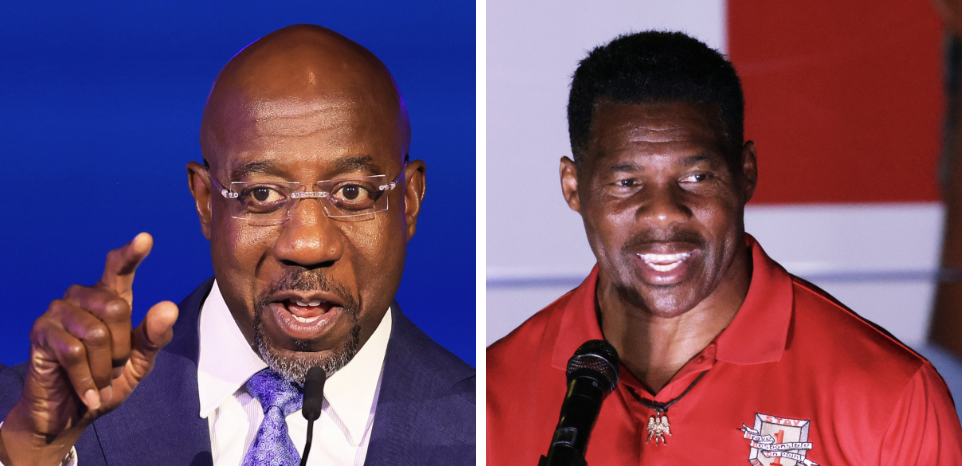Everything you need to know about the Georgia Senate runoff


A free daily email with the biggest news stories of the day – and the best features from TheWeek.com
You are now subscribed
Your newsletter sign-up was successful
The race for Georgia's Senate seat is not over just yet, as CNN and NBC News projected Wednesday that the election between Sen. Raphael Warnock (D) and Republican challenger Herschel Walker will go to a runoff.
While Warnock is currently winning with 49.2 percent of votes to Walker's 48.7, Georgia requires candidates to garner at least 50 percent of the vote share to carry the seat. As a result, Georgians will head to the polls once again on Dec. 6 to determine the race's final outcome.
Races across the ballot in Georgia have been watched closely this year, and the winner between Warnock and Walker could prove to be the deciding factor in which party retains control of the Senate.
The Week
Escape your echo chamber. Get the facts behind the news, plus analysis from multiple perspectives.

Sign up for The Week's Free Newsletters
From our morning news briefing to a weekly Good News Newsletter, get the best of The Week delivered directly to your inbox.
From our morning news briefing to a weekly Good News Newsletter, get the best of The Week delivered directly to your inbox.
Both candidates are expected to deliver remarks sometime Wednesday, officials said. Leaders from both parties additionally told CNN they both "intend to double down on their significant investments in Georgia," especially given what is likely to be extremely high stakes for the Senate.
This marks the second election cycle in a row that Georgia has seen a race come down to the wire. In 2020, control of the Senate was similarly decided by a runoff won by Warnock, who ousted incumbent Republican Kelly Loeffler. This helped secure a blue Senate due to a parallel victory by Sen. Jon Ossoff (D), who, like Warnock, won his seat in yet another runoff.
With the available paths to Senate control narrowing, the runoff between Warnock and Walker is likely to have similar ramifications.
A free daily email with the biggest news stories of the day – and the best features from TheWeek.com
Justin Klawans has worked as a staff writer at The Week since 2022. He began his career covering local news before joining Newsweek as a breaking news reporter, where he wrote about politics, national and global affairs, business, crime, sports, film, television and other news. Justin has also freelanced for outlets including Collider and United Press International.
-
 How the FCC’s ‘equal time’ rule works
How the FCC’s ‘equal time’ rule worksIn the Spotlight The law is at the heart of the Colbert-CBS conflict
-
 What is the endgame in the DHS shutdown?
What is the endgame in the DHS shutdown?Today’s Big Question Democrats want to rein in ICE’s immigration crackdown
-
 ‘Poor time management isn’t just an inconvenience’
‘Poor time management isn’t just an inconvenience’Instant Opinion Opinion, comment and editorials of the day
-
 Witkoff and Kushner tackle Ukraine, Iran in Geneva
Witkoff and Kushner tackle Ukraine, Iran in GenevaSpeed Read Steve Witkoff and Jared Kushner held negotiations aimed at securing a nuclear deal with Iran and an end to Russia’s war in Ukraine
-
 Pentagon spokesperson forced out as DHS’s resigns
Pentagon spokesperson forced out as DHS’s resignsSpeed Read Senior military adviser Col. David Butler was fired by Pete Hegseth and Homeland Security spokesperson Tricia McLaughlin is resigning
-
 Judge orders Washington slavery exhibit restored
Judge orders Washington slavery exhibit restoredSpeed Read The Trump administration took down displays about slavery at the President’s House Site in Philadelphia
-
 Hyatt chair joins growing list of Epstein files losers
Hyatt chair joins growing list of Epstein files losersSpeed Read Thomas Pritzker stepped down as executive chair of the Hyatt Hotels Corporation over his ties with Jeffrey Epstein and Ghislaine Maxwell
-
 Judge blocks Hegseth from punishing Kelly over video
Judge blocks Hegseth from punishing Kelly over videoSpeed Read Defense Secretary Pete Hegseth pushed for the senator to be demoted over a video in which he reminds military officials they should refuse illegal orders
-
 Trump’s EPA kills legal basis for federal climate policy
Trump’s EPA kills legal basis for federal climate policySpeed Read The government’s authority to regulate several planet-warming pollutants has been repealed
-
 House votes to end Trump’s Canada tariffs
House votes to end Trump’s Canada tariffsSpeed Read Six Republicans joined with Democrats to repeal the president’s tariffs
-
 Bondi, Democrats clash over Epstein in hearing
Bondi, Democrats clash over Epstein in hearingSpeed Read Attorney General Pam Bondi ignored survivors of convicted sex offender Jeffrey Epstein and demanded that Democrats apologize to Trump
